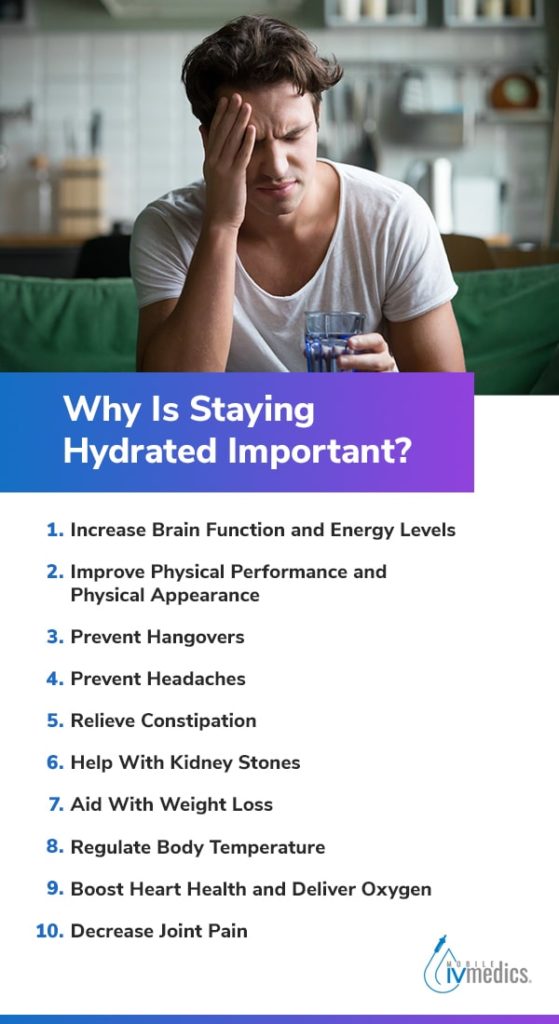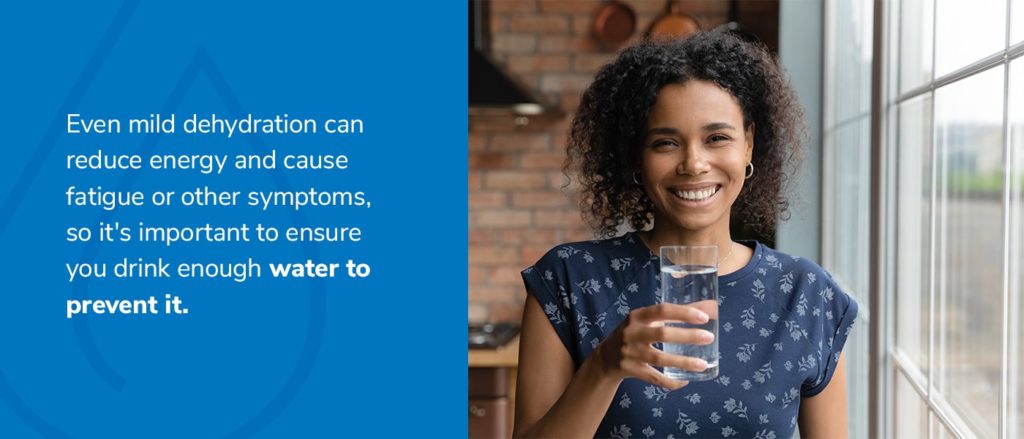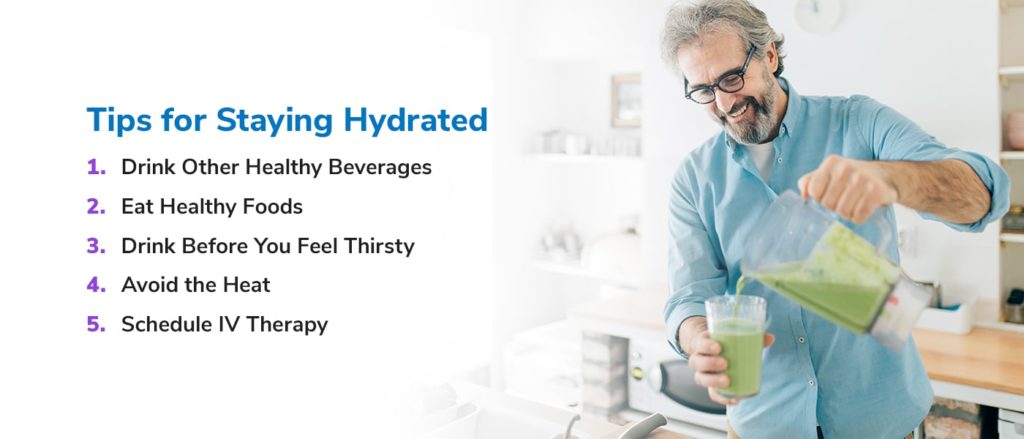The entire body depends on water for health, organ function, proper digestion, appearance, and cognition. Staying hydrated significantly benefits the body, and you probably notice how much happier and healthier you feel when you are well-hydrated.
Dehydration can happen quickly if you consume too little water, engage in intense exercise, overheat, or experience illness. You may even wake up feeling thirsty and ruining a good night’s sleep.
Dehydration can cause uncomfortable symptoms such as digestive complications, dry skin, fatigue, headaches, and pain. It’s important to prevent dehydration and avoid uncomfortable symptoms by maintaining adequate water levels. It can be easy to forget to consume water throughout the day, but drinking water is not the only way to stay hydrated.
Staying hydrated has incredible benefits for your mind and your body, and you can take simple, easy steps to keep your body hydrated. To help you understand the importance of staying hydrated, we created a guide that includes hydration benefits and tips for keeping your body hydrated.
- Why Is Staying Hydrated Important?
- What Dehydration Does to Your Body
- How Much Water Do You Need?
- Tips for Staying Hydrated
- Stay Hydrated With Mobile IV Medics

Why Is Staying Hydrated Important?
Hydration is incredibly important for your overall health. It affects almost every part of your body and is essential for proper organ functioning. The benefits of staying hydrated can significantly improve your mental and physical health and prevent the uncomfortable symptoms that come with dehydration. Hydrating your body can do the following for you:
1. Increase Brain Function and Energy Levels
Hydration significantly affects your brain and energy levels. Mild dehydration can hinder brain functions such as concentration and mood. Water makes up 75% of the brain and is important to cognitive performance. It helps the brain produce essential neurotransmitters and hormones.
Staying hydrated can increase a person’s reaction times and ability to multitask and can prevent feelings of anxiety. It can also increase coordination and attention. Hydration helps individuals focus on important tasks, solve problems faster and feel calmer and happier.
Staying hydrated can also increase energy levels if a person experiences dehydration. Dehydration causes fatigue, so replenishing the body’s water supply can reverse lethargy. Staying hydrated increases the body’s ability to circulate oxygen to the brain and throughout the body. Since dehydration can cause the heart to work harder to perform these functions, it can decrease energy levels. Drinking more water helps the heart operate easily and conserve energy for other functions.
2. Improve Physical Performance and Physical Appearance
Physical activity causes the body to lose water through sweat. Hydration maintains the body’s necessary water levels during physical activity and increases performance. Without adequate water levels, a person can experience fatigue, decreased motivation and changed body temperature control. Consuming enough water can prevent these effects.
Muscles consist of 80% water, and losing even 2% of the body’s water content can noticeably affect physical performance. It’s important to stay hydrated before, during and after exercise, especially during intense physical activity or activity that occurs in high heat.
Staying hydrated can also affect your physical appearance and make you look healthier. The skin needs water to maintain its elasticity and moisture. When you stay hydrated, water will benefit your skin in the following ways:
- Water flush toxins out of your body to prevent them from clogging your pores.
- Hydration helps your skin maintain its moisture.
- Water plumps up your cells for greater elasticity.
- Hydration will balance your PH levels.
- Hydration helps your skin maintain its tightness.
3. Prevent Hangovers
Since alcohol is a diuretic, it causes the body to lose more water than it absorbs. Dehydration contributes to and increases hangover symptoms such as fatigue, thirst, dry mouth and headache. Staying hydrated can prevent hangovers by increasing the body’s water levels. If you plan to drink alcohol, try drinking a glass of water after each alcoholic beverage, and remember to drink a glass before falling asleep at the end of the night.
4. Prevent Headaches
Dehydration can cause headaches and exacerbate headache disorders such as migraines. Staying hydrated can prevent headaches and the pain they cause. Since the brain is 75% water, water consumption is important to keep it in a healthy state. Studies show that drinking water can reduce the duration, pain and frequency of headaches.
5. Relieve Constipation
Constipation hinders the body’s ability to pass stool and causes infrequent bowel movements. Your digestive system depends on water to function properly, so it’s important to maintain adequate water levels. Water helps the body flush feces, urine and toxins from the body.
Staying hydrated can prevent constipation, and increasing hydration can help treat it. Water helps the body break down soluble fiber and properly digest food.
6. Help With Kidney Stones
Kidney stones are hard deposits in the kidneys that form when there are high levels of oxalate, calcium, uric acid or cystine in the body. Water dilutes mineral concentration in the urine, so it can prevent them from crystallizing and forming stones. Higher water intake can also help the body pass kidney stones.
7. Aid With Weight Loss
Staying hydrated can help you lose weight. Water can slightly increase the body’s metabolism, which helps you burn more daily calories. Additionally, drinking water before meals can help you feel more full, suppressing your appetite so you crave and take in fewer calories.
8. Regulate Body Temperature
Your body temperature also depends on water. Staying hydrated can help your body cool down in high-heat situations because it contributes more moisture to the body. When the body overheats, the skin’s middle layers release sweat that cools the body when it evaporates. With low water levels, the body’s heat storage increases and its ability to tolerate heat strain decreases. You can increase your body’s ability to tolerate the heat when you intake more water.
9. Boost Heart Health and Deliver Oxygen
Water is essential for heart health. Increased water intake can reduce blood thickness and help the body maintain healthy blood pressure. Additionally, staying hydrated can help prevent future heart failure. The heart consists of 73% water, so staying hydrated will help provide your heart with what it needs.
Water is also important for the blood. Blood carries oxygen throughout the body, and staying hydrated can help the blood effectively perform this function.
10. Decrease Joint Pain
The body’s cartilage is made up of approximately 65%-80% water. Cartilage is found in the body’s joints, and joints depend on it for shock absorption. Adequate water intake lubricates the joints so there is less friction when the body moves. It provides the hydration cartilage needs to provide shock absorption and properly cushion joints to prevent pain.

What Dehydration Does to Your Body
Water is essential for your entire body, and dehydration can significantly affect it in several ways. Dehydration is a condition that occurs when the body’s water loss exceeds its intake. The body loses water through sweating, bowel movements and urination, and you must maintain a healthy water intake to replace the water you lose through these functions. If you are dehydrated, you may notice some of all of the following signs:
- Thirst
- Lightheadedness
- Fatigue or drowsiness
- Dry mouth
- Bad breath
- Less frequent urination or sweating
- Dark-colored urine
- Dry skin
- Constipation
- Headache
- Sugar cravings
Dehydration can also cause more serious symptoms. Seek immediate medical attention if you experience any of the following symptoms:
- Fainting
- Confusion
- Rapid breathing
- Increased heart rate
- Lack of urination
- Shock
Even mild dehydration can reduce energy and cause fatigue or other symptoms, so it’s important to ensure you drink enough water to prevent it. It’s also important to replenish your body’s water supply as soon as you start to notice minor dehydration symptoms and seek medical care if you experience severe symptoms.
How Much Water Do You Need?
The daily amount of water a person should drink varies depending on various factors. Average healthy men should take in approximately 15.5 cups of water daily while average healthy women should take in approximately 11.5 cups. However, this number will be different for each person based on the following factors:
- Health: Certain illnesses such as diarrhea, vomiting and fevers can deplete your body’s water levels. If you experience an illness, you may need to take in more water than usual to replenish your body.
- Activity level: Physical activity causing perspiration will cause your body to need more water than usual. The more intense the exercise, the more water you will need to stay hydrated.
- Environment: Hot temperatures and humid weather can make you sweat more, causing your body to require more water. Traveling at high altitudes can also increase the amount of water you need.
- Pregnancy: Pregnant or breastfeeding women need to take in more water than usual to stay hydrated.
- Age: Older individuals are at a higher risk for dehydration, so people often have to drink more water to maintain hydration as they age.

Tips for Staying Hydrated
Drinking water is not the only way to stay hydrated. The body can receive its daily water amount in various forms, so there are several ways to keep your body well-hydrated. You can replenish your body’s water in the following ways:
1. Drink Other Healthy Beverages
While it’s important to drink plenty of water throughout the day, water is not the only hydrating beverage. You can add some variation to your day by drinking juice, low-fat or skim milk and herbal teas. These liquids are mostly made up of water, and some also contain nutrients or electrolytes.
These drinks should not completely replace your water consumption, but drinking a glass of milk or tea between glasses of water can help you maintain your liquid intake. Try to avoid sugar-sweetened drinks such as energy drinks, soda and sports drinks because they contain significant added sugar.
2. Eat Healthy Foods
Healthy foods are also partially made up of water. Vegetables and fruit contain nutrients and have high water content. The following fruits and vegetables contain high amounts of water:
- Peaches
- Strawberries
- Cantaloupe
- Watermelon
- Pineapples
- Leafy greens
- Celery
- Cucumbers
- Radishes
- Tomatoes
- Zucchini
3. Drink Before You Feel Thirsty
Thirst is a sign of dehydration, so you are probably already slightly dehydrated if you start to feel thirsty. Try to drink plenty of water and other beverages containing water before you feel thirsty to avoid dehydration. If you find plain water difficult to enjoy, try adding flavor to it. Add some fruit juice or some fresh fruit to a glass of water. Squeezing some lemon juice into your water can give it a pleasant flavor and make it more enjoyable to consume.
4. Avoid the Heat
In some locations, hot weather is inevitable. However, there are things you can do to protect your body from dehydration and overheating on hot days. Stay inside air-conditioned rooms as much as possible when the outdoor temperature is high. If you have to go outside, you can keep your body cool by wearing loose-fitting and light clothing. You can also wear a hat to keep the sun off of your head and use sunscreen to avoid sunburn.
5. Schedule IV Therapy
An excellent solution for treating dehydration symptoms is IV therapy. IV therapy delivers minerals and vitamins directly to the bloodstream through an IV drip. IV therapy for hydration contains a saline solution with water, sodium chloride and electrolytes to rehydrate your body. When you receive IV therapy to rehydrate your body, you can also choose to include any of the following additional nutrients:
- Taurine
- Vitamin C
- Zinc
- Vitamin B complex
- Vitamin B12
- Glutathione
- Anti-heartburn medicine
- Anti-nausea medicine
- Magnesium
IV therapy is an effective rehydration method for adults experiencing uncomfortable symptoms. It’s a great choice for anyone recovering from intense exercise, alcohol consumption or illness. You can also schedule IV therapy if you feel like you need a hydration boost. IV therapy is an easy way to rehydrate. When you schedule an IV drip, a registered nurse will travel to you so you can receive treatment in the comfort of your own home.

Stay Hydrated With Mobile IV Medics
Staying hydrated can help you maintain health, energy, performance and physical appearance. Your entire body relies on hydration for proper functioning and longevity, so it’s important to provide your organs with the water they need to stay healthy.
While drinking water is the primary way to stay hydrated, it is not the only way. You can also hydrate your body by eating healthy foods, drinking additional beverages high in water content, watching for early signs of dehydration and avoiding the heat. You can also schedule IV therapy for a safe, quick and easy way to rehydrate. Mobile IV Medics will provide hydrating IV therapy in the comfort of your home so all you have to do is relax and enjoy the benefits.
IV therapy can ease symptoms of dehydration as it delivers water and nutrients to your bloodstream. You can get back to feeling healthy and energized with IV therapy from Mobile IV Medics. Whether recovering from a night out enjoying alcoholic beverages or an intense workout in the sun, IV therapy is an effective way to rehydrate and replenish your body. Contact Mobile IV Medics to learn more or book an appointment to start your IV therapy.





